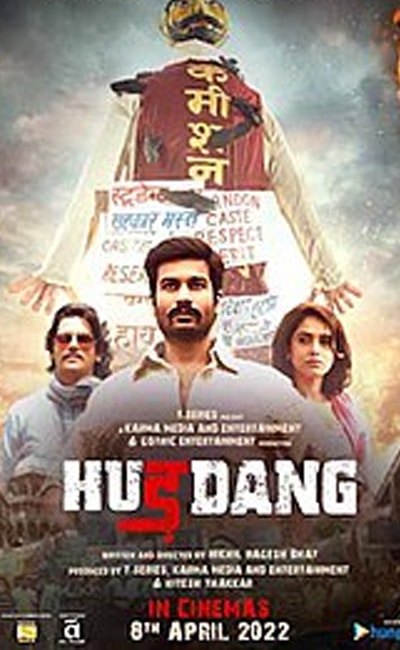
CAST: Sunny Kaushal, Nushrratt Bharuccha, Vijay Varma
DIRECTED BY: Nikhil Nagesh Bhat
BLUF: A love story set in the backdrop of the student agitation of 1990 in Allahabad.
Jhulan knows that it is going to be extremely difficult for her parents to accept Daddu, who she is in love with unless he passes the UPSC (Indian Administrative Services) exam.
Daddu knows that he will never be able to pass UPSC exams as he is not at all academically inclined. But he has devised a way out. Loha Singh, a local student leader has all the correct connections to leak competitive examination’s question papers.
Daddu and Loha form a friendship where Daddu helps Loha’s business in the hope to benefit from it himself.
Loha sets up the entire stage for Loha so he can clear his civil services entrance exam.
With Loha’s political connections, he makes sure that Daddu will get ‘special treatment’ and would even take the exam in the District Magistrate’s personal chamber. On the D-day, Mandal Commission introduces its recommendations and because of that reservations are introduced into the UPSC selection process where based on caste of the candidates,less deserving candidates of lower caste would get preferential treatment in the civil services cadre.
This breaks Daddu’s heart and his hopes of marrying Jhulan come crashing upon him.
THE MEAT AND THE POTATOES
The Problem reservation mein nahi hai, problem hai caste-based reservation mein (The problem is not in the reservation, the problem is in the caste-based reservation)”
The whole trouble with Nikhil Bhat’s Hurdang is that it holds a very myopic view of caste-based reservation in India and makes absolutely no effort to correct that narrative.
The story is set in 1990 and follows Daddu (Sunny Kaushal), a college student in Allahabad, who believes in grabbing things by creating a commotion. He has joined hands with the highly corrupt and shrewd Loha Singh (Vijay Varma) to make money by selling students examination question papers .Whereas Singh wants to become an Member of Legislative Assembly , all Daddu wants to do is qualify the exam to become a bureaucrat so he gets to marry the girl he likes.
When the ruling government proposes to implement the Mandal Commission’s recommendation to reserve 27 per cent Government jobs for marginalized and Other Backward Castes (OBCs), Singh sees it as a perfect opportunity to exploit Daddu for his gains.
Brainwashed by Singh, Daddu is convinced that the reservation law is discriminatory to the upper castes. Daddu rejects any possibility of passing the Bureaucracy exam because Singh has drilled it into him that no matter what, people, who do not deserve it, will take advantage of the quota system to secure Government jobs
So instead of studying for the exams, Daddu gathers students, stages a protest outside the Chief Minister’s residence and gets into fights.
IN THE KNOW
Jhulan (Nushrratt Bharuccha), who is an OBC, and an IAS aspirant tells her father about the importance of “equal opportunity”. “I have the privilege of getting into expensive coaching centers and availing the best education. The reservation should be for those who are deprived of such opportunities” at the beginning However, by the second half, she has changed her stance. Now, Jhulan believes that reservations should exist, but not based on caste.
The screenplay is not researched, and it does not really talk about why caste system exists in India in the first place that made Mandal commission recommendations important in the first place.
The movie is a privileged class rant against any benefits given to marginalized members of a country who have suffered discrimination for centuries.
“A Brahmin’s son can also be poor, so can someone be belonging to other castes. That’s why it’s important to protest caste-based reservation. The best solution would be to make education free for all” – says a character in the movie.
The movie reeks of privilege and despite good actors, the story is just sheer disappointment.




